-

人教版新目标初中英语七年级下册Where is the post office教案2篇
Period 2 (3a----Section B 2c)Preview(Pre-task): Key points: What laAdd another information about their pen pals----their language on the cardnguage does she/he speak?She/He speaks....Does she/he have any brothers and sisters? Does she/he speak English?Preview(Pre-task): Add another information about their pen pals----their language on the cardKey points: What language does she/he speak?She/He speaks....Does she/he have any brothers and sisters? Does she/he speak English?Step 1 Revision1.Revisionand dictation of the new words 2.Revise the drills they learned yesterday.(by pairwork and grammar exercise)Step 2 Leading-inT has a conversation with one student. The conversation is following:---Do you have a pen pal?---Yes, I do.---What's your pen pal's name? ---His/Her name is....---Where is your pen pal from? ---He/She is from...---Where does he/she live? ---He/She lives in....---What language does he/she speak?He/She speaks...Write the new words on the Bb. They are following: EnglishChineseJapaneseFrenchStep 3 LearnLearn the new words with the whole class.Finish 3a with the students3b Pairwork T still does an example with one student Then the Ss practise in pairs. The example is following:--Curry Muray is my pen pal. He is from the United States.---What language does he speak?

人教版新目标初中英语七年级下册I want to be an actor教案2篇
三、教学建议第一课时:1. Lead in (Vocabulary)A) Before class, teacher should collect some pictures of working places. For example: Bank, TV Station, Restaurant, Police Station, Hospital ...B) In class, show students the pictures (PowerPoint, OHP). Ask students to tell the name of the working places and the name of the jobs.Shop assistant, doctor, actor, reporter, police office, waiter, bank clerk, studentC) Do exercise 1a and 3a.2. Bingo GameAsk groups of students to make up pairs of cards with a job on one and the related workplace on the other. For example, waiter / restaurant, teacher / school, doctor / hospital. Encourage students to use both the job / workplace combinations in the book and the ones that students came up during class discussions. Be sure they have twice as many sets of cards as there are students in the group. They can make two sets of cards for a single job / workplace, if necessary. Then have each group mix up its set of cards and hand their cards out in random order. Each time a student gets a pair of cards that match, he or she can lay these cards down. The goal is to have no cards in your hand at the end.3. Task OneA) Ask students to work in pairs and ask the partner what does he / she want to be in the future.e. g. :What do you / does he / does she want to be?I want to be a.Why?Because it's (adj).B) Vocabulary: Section B, 1a4. Homework 1.2.
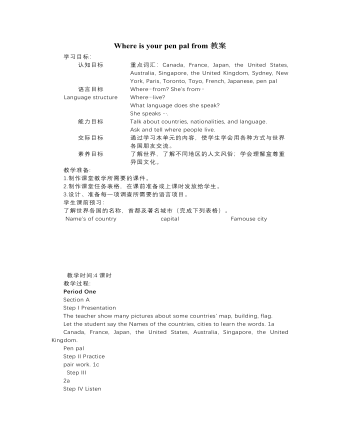
人教版新目标初中英语七年级下册Where is your pen pal from教案
2.1Match the country with the language.Step II Reading3a? let the students read the letter fast and answer the questions.? Let the students ask more questions about the letter as possible as the can.Step III Writing3b.Step IV. Pairwork2cStep V Listening2a, 2bStep V. HomeworkExercises book(1) P3Exercises book (2) P3Period FourStep I . Dictate the words and sentences in Unit1.Step II. Self-checkStep III. Check the answers for Exercises book in the unit.Step IV. Home workRevise and preparation for unit 2.教学反思:通过本单元的学习,学生基本可以谈论人们的国籍,居住城市及其所说的语言,通过书信方式去介绍自己并寻找笔友。但在涉及到国外的一些城市时,学生对这方面的知识相对欠缺,能介绍的城市并不多,也反应出学生课前预习不充分,这跟学生学习条件也有关,大多数学生无法通过网络获取所需信息。因此,在以后的教学中要多指导学生通过计算机网络获取信息,拓宽知识面。
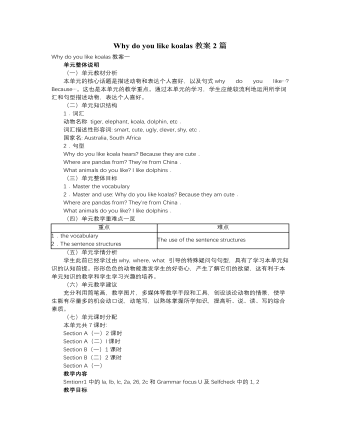
人教版新目标初中英语七年级下册Why do you like koalas教案2篇
单元整体说明(一)单元教材分析本单元的核心话题是描述动物和表达个人喜好,以及句式why do you like…? Because…。这也是本单元的教学重点。通过本单元的学习,学生应能较流利地运用所学词汇和句型描述动物,表达个人喜好。(二)单元知识结构1.词汇动物名称 tiger, elephant, koala, dolphin, etc.词汇描述性形容词: smart, cute, ugly, clever, shy, etc.国家名: Australia, South Africa2.句型Why do you like koala hears? Because they are cute.Where are pandas from? They're from China.What animals do you like? I like dolphins.(三)单元整体目标1.Master the vocabulary2.Master and use: Why do you like koalas? Because they am cute.Where are pandas from? They're from China.What animals do you like? I like dolphins.(四)单元教学重难点一览(五)单元学情分析学生此前已经学过由why, where, what 引导的特殊疑问句句型,具有了学习本单元知识的认知前提。形形色色的动物能激发学生的好奇心,产生了解它们的欲望,这有利于本单元知识的教学和学生学习兴趣的培养。
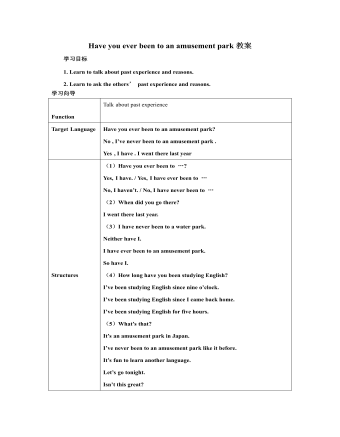
人教版新目标初中英语八年级下册Have you ever been to an amusement park教案
(1)Have you ever been to …? Yes, I have. / Yes, I have ever been to …No, I haven’t. / No, I have never been to …(2)When did you go there? I went there last year. (3)I have never been to a water park. Neither have I. I have ever been to an amusement park. So have I. (4)How long have you been studying English? I’ve been studying English since nine o’clock. I’ve been studying English since I came back home. I’ve been studying English for five hours. (5)What’s that? It’s an amusement park in Japan. I’ve never been to an amusement park like it before. It’s fun to learn another language. Let’s go tonight. Isn’t this great?space museum, amusement park, water park, South America, Peru, Holland, European culture, tour guide, flight attendant, musical instrument, more than, be from, get to, take lessons, neither, discover, graduate, change
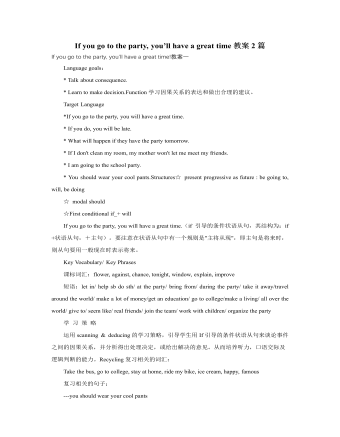
人教版新目标初中英语八年级下册If you go to the party, you’ll have a great time教案2篇
区分宾语从句、定于从句和状语从句宾语从句和状语从句,都叫做主从复合句。宾语从句主要是中考必考的,是初中阶段必掌握的从句,宾语从句主要是掌握三要素,所谓宾语从句,就是宾语在主从复合句当中充当宾语的一个句子,叫做宾语从句。主句的谓语动词是及物动词,后面如果是词或者是短语的话,是简单句,如果是句子的话,肯定是宾语从句。I know that he good at English.就是宾语从句,三要素,一要素是要注意连词,连词一共学了三类连词,一类连词是that口语当中可以省略,就像刚才说的那一句,I hear he is good at English.还有疑问代词、疑问副词,how where when,疑问代词、疑问副词。还有一类连词weather是否的意思,不是状语从句当中的如果,这一定要和如果区分开,这是是否。I don't know if he interested at English。宾语从句要注意if是连词。第二要素是语序,要用陈述举语序。比如说你家有几口人,我们都说How many people are there in you family?但是这是简单句,一旦说成宾语从句,你可以告诉我你家有几口人吗?Could you tell me how many people there are in you family ?

人教版新目标初中英语八年级下册It’s a nice day, isn’t it教案2篇
"Hello! Welcome to English class! Introduce yourself. Meet your new classmates." That's what the teacher says. What do you say? "Oh no!" It can be difficult talking to new people. But it can be fun, and you can make friends. How do you do it? Make small talk. Small talk is polite conversation. "Wang Nan is a great pingpang player, isn't she?" "I'd love to meet her, wouldn't you?" "It's been raining a lot, hasn't it?" Tag questions are a form of polite speech. To make small talk successfully, you should know how to make them. You should also know what topics to talk about. Try to learn this unit carefully. The next time you're in English class, you'll find out. Making small talk's easy, isn't it? (“你好!欢迎你!请做一下自我介绍。认识一下你的新同学。”通常在课上老师会这样说。你会说什么呢?“噢,不!”与陌生人谈话太困难了。但是这也很有意思,并且你还能交到朋友。你该怎么做呢?闲聊。闲聊指得是礼貌的对话。“王楠是一个很棒的乒乓球运动员,不是吗?”“我希望自己能认识她,你呢?“今年的雨水很多,不是吗?”反意疑问句是一种礼貌用语。为了使得谈话成功,你应该知道怎样去进行闲聊。你还应该知道与不同的人该谈论什么样的话题。认真的学习这个单元吧,下次在英语课上,你会发现与大家展开谈话是一件很容易的事情,不信我们来试试。)

人教版新目标初中英语八年级下册He said I was hard-working教案2篇
This activity introduces some new vocabulary and provide oral practice using the target language.Task 1 . Ask four students to stand in front of the class, and the teacher asks them the following questions as a reporter.1.What are you going to do when you grow up?2.What are you going to do next week?3.What are going to do after school?The students will give different answers, then ask a good student to report what they said.I am going to e a doctor.What did she say?----------She said she was going to be a doctor.I am going to have a party on Friday night.What did he say?-------He said he was going to have a party on Friday night.I am going to do my homework.What did she say ?------ She said she was going to do her homework.I am going home after school.What did she say?-----She said she was going home after school.Say In this unit we are going to learn to use words like to report what someone said.Task 2. Read the instructions. Then ask a student to read the four questions. And write the words on the Bb. Explain what soap opera is.Task 3. Ask the students to Look at the pictures, point out the TV screens in the picture. Ask one girl to read what Marcia said.What did Marcia say? She said She said she was having a surprise party for Lana on Friday night. Repeat the other pictures in the same way.Activity3. Listen and number the pictures in activity 1a.

人教版新目标初中英语八年级下册What were you doing when the UFO arrived教案2篇
(一).知识方面: 1.培养学生能运用过去进行时来描述、谈论过去某个时间正在发生的事情或动作的意识和能力,能就过去某个时间正在发生的动作做出正确的描述。 2.培养学生的想象力和角色扮演的合作能力。 3.培养学生讲述过去发生的事情经过的能力。能正确运用一般过去时来讲述故事。 (二).技能方面: 1.本单元的语言目标是Talk about past events and tell a story(谈论过去的时间和讲述一个故事),围绕这一目标,要涉及句型: What were you doing when the UFO arrived? ----I was sitting in the barber’s chair. The barber was cutting my hair. 因此必须学习standing、studying、cleaning、sleeping、cooking、making、eating、cutting、等表示地点的词,以便为上述句型提供语言材料。2.学习过去进行时的有关知识。Was/were+现在分词,是该时态的表达式。 3.在学习过程中,要区分The boy was walking down the street when the UFO landed.和While the boy was walking down the street, the UFO landed.这两种由when和while引导的状语从句的句型结构。注意它们的不同。
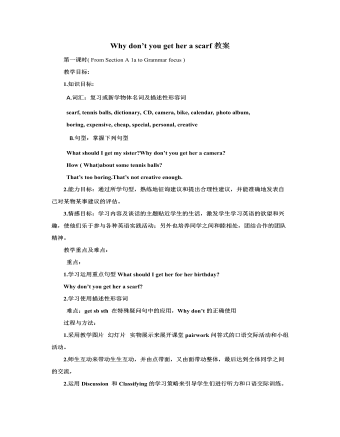
人教版新目标初中英语八年级下册Why don’t you get her a scarf教案
教师带领学生复习有关描述宠物的词汇,采用教师提问学生回答的方进行。如:T:What animals do you think would be good pets?What animals do you think would be bad pets?What do you think are good animals for a six-year-old child?然后学生进行 pairwork 练习。Task two: 师生互动,学习探究 1、播放3a部分的录音,引导学生一边听录音,一边跟读。2、通过听录音学生回答以下问题:Why do you think pot-bellied pigs are popular?What are the advantages and disadvantages of keeping such a pet?教师对学生的回答进行及时点评。3.学习范文,学习重点短语,为下步的模仿写作提供语言素材。T :1. )Have you ever kept a pig as a pet?Do you like pigs? St.:No.…Why don’t you like to keep a pig? St: No.They’re too dirty and lazy(Do you know in some foreign countries like Hollyland, Australia,pigs are the most popular pet.there’s a kind of pig.(图)it has an interesting name? it ‘s called a pot-bellied pig.) Now,let’s learn an article about this kind of interesting pet.2.)play the tapeSt.:Listen and repeat3.)show some Qs on computer(本子St.: read silently,then answerthe Qs(本子)4.)Ask ss. Close book and retell this passage.(what is a pot-bellied pig? Is it a good or bad pet? ) St.: retell it to each other“A pot –bellied pig is a popular pet now…”5.read the article together.St.:.practice reading

人教版新目标初中英语九年级下册By the time I got outside, the bus had already left教案
Ⅰ. Teaching Aims and Demands1. Knowledge Objects(1) Key Vocabularyoversleep(2) Target LanguageWhat happened?I overslept. And by the time I got up, my brother had already gotten in the shower.2. Ability Objects(1) Teach the students to use the new words.(2) Train the students to narrate past events with the Past Perfect Tense.(3) Train the students' listening and speaking skills with the target language.3. Moral ObjectIt’s a good habit to go to bed early in the evening and get up early in the morning. So you’ll never be in a hurry in the morning.Ⅱ. Teaching Key Points1. Key Vocabularyoversleep2. Target LanguageNarrate past events with the Past Perfect TenseⅢ. Teaching Difficult Points1. Train the students to narrate past events with the Past Perfect Tense.2. Train the students to understand the target language in spoken conversation.Ⅳ. Teaching Methods1. Thinking of examples from the students' real lives.2. Making sentences by looking at the pictures.Ⅴ. Teaching AidA tape recorderⅥ. Teaching ProceduresStep I Revision1. Revise the language points in Unit 8.Ask some questions like this: What volunteer work would you like to do?Help the students to answer, I’d like to…/I love to…/I hope to2. Practice the dialogue in Activity 3c on page 62 again. Get students to role play the similar dialogues with the following.

人教版新目标初中英语九年级下册We’re trying to save the manatees教案2篇
本单元主要围绕着有关濒临灭绝的动物这一话题,学习了应该怎样保护我们的环境,以及就某一问题展开辩论。目标提示语言目标能够运用所学知识,就某一问题展开辩论。认知目标1、复习一些语法:现在进行时、一般现在时、用used to 表示一般过去时、现在完成时、一般过去时的被动语态。2、学会表达同意和不同意。3、学会以下基本句型:We’re trying to save the manatees.Manatees eat about 100 pounds of food a day.There used to be a lot of manatees.In 1972,it was discovered that they were endangered.Some of the swamps have become polluted.情感目标了解一些濒临灭绝的动物的生活习性和濒临灭绝的原因,教育学生应该如何保护环境。教学提示充分利用多媒体等教学设备,创设与本课话题相关的情境,如各种不同种类的动物、动物园以及有关环境的画画等等。围绕着本单元的教学目标,设计一些贴近学生实际的教学任务,如让学生谈论自己最喜欢的动物,如何拯救濒危动物,如何保护环境等等。让学生根据所学知识,就动物园是否对动物有利以及其他的话题进行辩论。
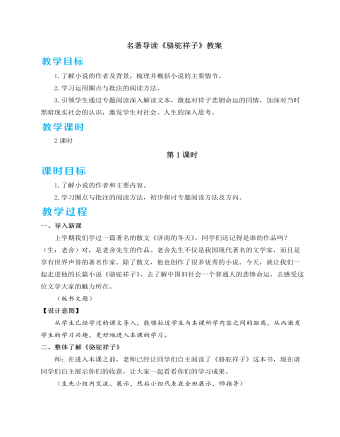
人教部编版七年级下册名著导读 《骆驼祥子》 圈点与批注教案
本环节交流的内容侧重于体验与心得,是建立在充分阅读后的再创作,也是对小说阅读方法和内容的总结性归纳和展示,需要学生有较高的阅读理解能力。三、延伸探讨《骆驼祥子》的艺术特色师:同学们,了解经典作品的艺术魅力,然后能运用到自己的写作中,是何等快乐的事啊!请你根据自己的阅读体验,概括对《骆驼祥子》这部小说艺术特色的评价。(生小组内交流、讨论,然后推荐代表在全班交流,师明确)预设 (1)结构紧密,线索分明。(2)语言朴实自然,生动明快,具有鲜明的地方色彩和浓厚的生活气息。幽默和“京味儿”语言运用熟练。(3)善于运用各种描写方法(肖像、心理、环境描写等)来表现人物的思想性格及发展变化。(4)有深厚的文化底蕴。写北京的生活,北京的车夫,北京种种的风俗人情等。在炎凉的世态中揭示地方文化。
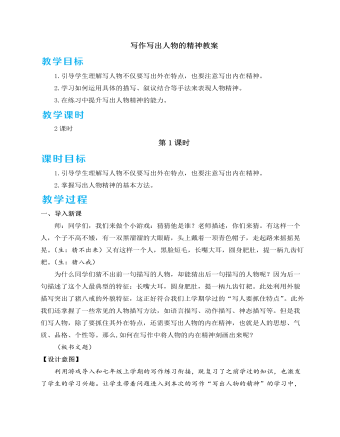
人教部编版七年级下册写作写出人物的精神教案
我来到书房,找到了字典,既想快点知晓答案,和妈妈比个胜负,又想慢点儿,万一又错了怎么办。我紧张地翻开字典,找到了“偌”字的读音。天呐,我是对的,我太开心了!(不足1:缺少动作描写,没有展现出“我”的紧张。修改:我使劲地捏着字典,颤抖着双手,慢慢地打开字典。不足2:结尾缺少人物的语言和神态描写,没有展现出人物开心的心理。修改:我眉飞色舞地大叫道:“天呐,我赢啦!我赢啦!”)我捧着字典,连蹦带跳地来到妈妈面前,欣喜若狂地说:“妈妈,你想不到吧,你一个堂堂初中老师,居然败在拼音不太好的女儿手下。哈哈,我终于报‘仇’了……”此时的我,简直比中了五百万还要开心一百倍。妈妈一听便傻了眼,刚才那坚定的神情已经荡然无存,妈妈连忙接过字典看了又看,生怕我看错了似的。看到字典上的读音,妈妈哑口无言。
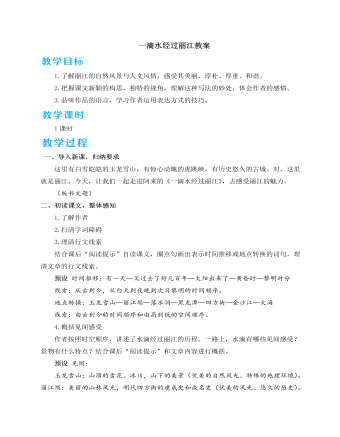
人教部编版语文八年级下册《一滴水经过丽江》教案
【设计意图】从诗意的语言入手,引导学生关注句式节奏、抒情性、叙事性、哲理性,品析语言,从而加深对文本的理解,体会作者对丽江的热爱、赞美之情,体会作者在景物描写中隐含的思想。五、总结存储1.教师总结作者虚构一个旅游者兼讲述者——“一滴水”,用它形成时空线索,串联起丽江的自然风光、历史文化、民俗风情,并着力表现景物背后的丽江的人文精神,来抒发作者对丽江古城与自然美妙融合的赞美之情,对丽江的醇美、和谐、沉静的赞美之情,对传统与现代文明和谐交融的赞美之情,对自然万物的热爱和生命平等的意识。诗意的语言中,有强烈的抒情,有厚重的历史感,有深邃的哲思。这“一滴水”折射出的,是阿来的思想、灵魂。2.布置作业(1)模仿本文的写法,写一篇不少于600字的随笔,选择一个恰当的视角,跨越时空,全面多角度展现家乡的自然风光、历史文化、风土人情。(2)课外阅读阿来的《大地的阶梯》,体会融景物、历史、感悟、思考于一体的游记风格。
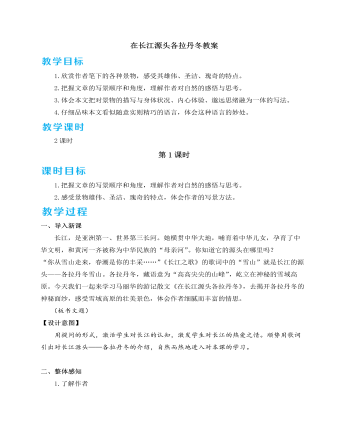
人教部编版语文八年级下册《在长江源头各拉丹动》教案
预设 第一组:(1)语言精准又生动形象,首先用长句总写各拉丹冬的变化多端,然后接连用短句,简笔勾勒各拉丹冬巍峨高大、棱角分明的特点,张弛有度,富有音乐美感。(2)用语精简而准确,形象性强,短促的句子节奏,很好地表现出冰体形状之多令人目不暇接,最后部分节奏放缓,形成一种张弛有度的音乐美,让句子又融入段落主体比较舒缓的节奏中去。第二组:(1)将自己的身体不适比喻为“小震”“大地震”,描写自己由于病痛而行动迟缓的“犹如霹雳舞的‘太空步’”,幽默之中,透露出作者乐观、坚强的精神和对探险事业的热爱。 (2)用“分外利落”形容自己拍摄冰山时跌倒骨裂的情景,好似没有痛苦一般。这幽默调侃之中,透露出作者乐观、坚强的精神。第三组:(1)“眩晕”原指一种症状,感觉到自己或周围的东西旋转,这里指“浩浩苍苍”的美景令人目不暇接,令人不知该看什么;“卖弄”原指有意显示、炫耀,含贬义,这里指大自然的无穷创造力在各拉丹冬展现得淋漓尽致。
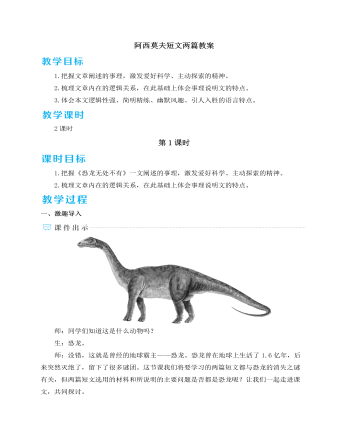
人教部编版语文八年级下册阿西莫夫短文两篇教案
预设 示例1:“板块背上驮着许多大陆,当板块向一个或另一个方向运动时,大陆也随之一起运动。”“驮”字形象地写出了大陆漂移的样子,使抽象的理论变得生动、有趣、易懂。示例2:“位于南极中心部位的南极洲是全球的大冰箱。”运用了打比方的说明方法,形象地说明了南极洲寒冷的程度和南极洲在地球生态环境中的重要位置。 示例3:“一立方英寸被压扁的沙子比一立方英寸普通的沙子要重得多。”运用作比较的说明方法,说明同体积被压扁的沙子比普通沙子重得多的特点。【设计意图】本环节设计的三个层次的语言赏析,让学生深入文本体会、学习语言简明精练、逻辑性强、幽默风趣的特点,提高学生的语言鉴赏能力,为今后的说明文写作夯实基础。四、总结拓展,激发思维所选的两篇课文就同一对象——恐龙从不同角度思考,从而发现新的论据或得出新的结论。文章给了我们一些有益的启示:不同领域的科学发现可以互相启发,从而有新的发现;要学会从不同角度思考问题。选择下面两个探讨任务之一课外完成。
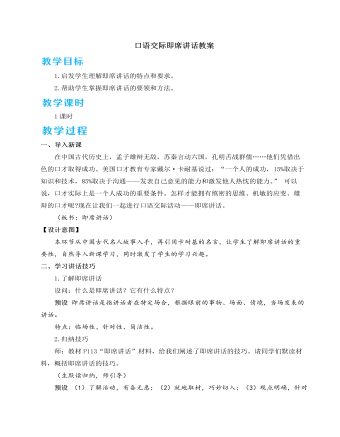
人教部编版语文八年级下册口语交际即席讲话教案
预设 示例:班上分享个人读书经验大家好!既然今天是交流读书体会,那么,我想结合自己的读书体会和大家聊聊读书。一个爱读书的民族,必定是一个文化素质较高的民族;一个爱读书的人,也必定是一个文化素质较高的人。读书能开阔我们的视野,提高我们的写作水平;读书能提升自身修养,丰富我们的人生底蕴。读书是我们精神的呼吸,能让人保持平淡的心境,变得博爱而无私。为了让我们的生活和心灵变得轻盈一些,我们需要读书。那么,应该怎样读书呢?其一,要择书而读。需要的才是最适合的,读适合的书才能有良多收获。如果没有特别需要的书要读,可以读经典。经典是经过岁月沉淀下来的人类智慧的结晶,可以让我们触摸先贤的思想,以充实自身。其二,要读而有术。要对好书反复品味,将其内化吸收,然后进行批判性阅读,有自己的思想主张和拓展探究价值判断;在读书过程中与作者进行辩论,最后形成自己的思想体系,为我所用,而不是让自己的脑袋成为别人思想的“跑马场”。
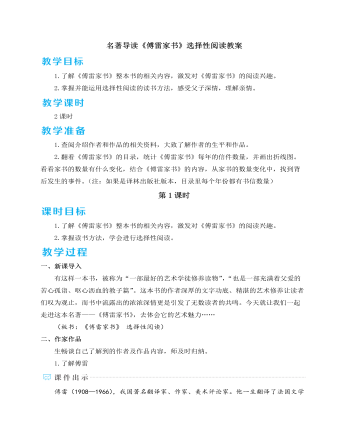
人教部编版语文八年级下册名著导读《傅雷家书》 选择性阅读教案
评价:这段话表明傅雷朋友的角色。他把孩子当成朋友,为人生得一知己而感到兴奋、自豪。在读这段话时声音应洪亮,感情应充沛。小结:我们组还发现傅雷对傅聪的称呼有很多,如聪、聪儿、孩子、亲爱的聪、亲爱的孩子。有时两个同时用,比如“聪,亲爱的孩子!”一直以来,我们都觉得父爱不善表达,可是傅雷的这些亲昵直白的称呼表达了他对傅聪的爱,是这么的温柔,如慈母一般。所以,读这些称呼时我们要读得轻柔深情些。【设计意图】这一环节不仅能展示学生的阅读成果,还能使学生感受到阅读的成就感,并在相互交流中产生更深刻的理解和感悟,在朗读和评价中体会父爱。二、感悟成长1.解读“虎爸”师:在同学们的阅读分享中,傅雷这样一个深爱儿子的父亲形象深入人心。其实,傅雷早期对傅聪的教育是很严苛的,是一个“虎爸”的形象。我们一起来看一则小故事。
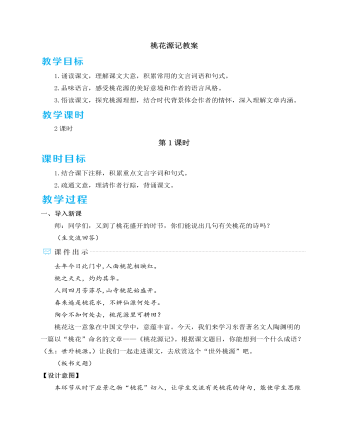
人教部编版语文八年级下册我一生中的重要抉择教案
五、总结存储1.教师总结这篇演讲词,作者用幽默诙谐的语言阐述了自己人生中的一个重要抉择——大力扶植年轻人。作者善于自我调侃,在自我解剖中进行了深入的分析,强调了扶植年轻人的重要性和必要性。演讲中列举了大量名人事例进行论证,使演讲具有很强的说服力。这篇演讲词展示了一位科学家精彩绝伦的语言魅力:不但有科学原理,而且有人生哲理;不但有学术的穿透力,而且有情感的震撼力;不但有理论的清晰度,而且有语言的幽默感——这一切构成了王选演讲的独特风采。我们在体会王选演讲魅力的同时,也领略到了他的人格魅力。2.布置作业(1)人的一生所做的重要抉择,如果与时代和国家紧密相连,意义会更加重大。我们在人生的关键阶段,如选择未来事业时,会做出怎样的抉择?请你写一段200字左右的演讲词,并在小组内演讲交流。(2)课外阅读王选的《我一生中的八个重要抉择》。









